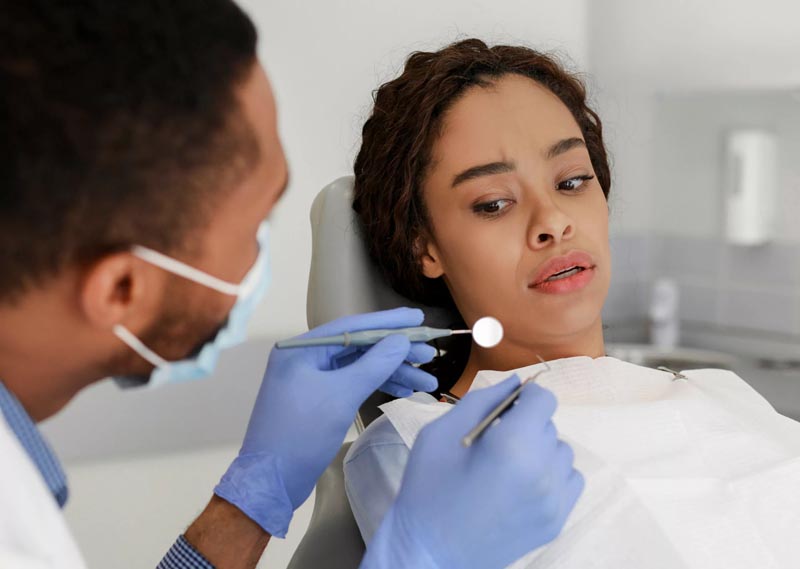Dental Anxiety Often Keeps People Away From the Dentist

Your oral and dental hygiene should be just as much of a priority as your overall health. The health of your mouth is connected to other health complications in your body, such as heart disease and lung infections. If you don’t take proper care of your mouth, you may put the rest of your body at risk. Along with proper dental hygiene routines, you should also regularly visit your dentist to receive a dental cleaning at least twice a year.
While dentists recommend teeth cleaning by a dental professional every six months, many people in the world avoid the dentist. According to the Columbia University College of Dental Medicine, nearly 40 million Americans avoid visiting their dentist because of dental anxiety or fear.
Unfortunately, dental anxiety is common across the globe. It keeps people from receiving the proper dental care they need to ensure the health of their teeth, gums, and mouth.
What Is Dental Anxiety?
It is incredibly common for people to not look forward to their upcoming dental appointments. Before their appointment, those with dental anxiety may experience feelings of unease. They’ll often have unfounded worries and fears about their appointment that are based on misconceptions. As soon as they enter the waiting area, they begin feeling nervous.
However, some suffer from dental phobia, which is far more serious and debilitating than dental anxiety.
Dental Phobia
As the name suggests, dental phobia is like other phobias. It is an intense fear or dread of the dentist. These individuals do not just experience simple nervousness or unease when visiting the dentist. They are often terrified.
Most people with dental phobia are completely aware that their extreme fears are irrational, but they still struggle to overcome them. They do anything and everything to avoid going to their dentist. Symptoms of dental phobia include:
- Trouble sleeping the night before a dental visit
- Increased feelings of nervousness as you progress through a dental office and waiting room
- Crying while thinking about visiting the dentist
- Feelings of physical illness while thinking about visiting the dentist
- Fainting
- Feeling sick or extreme unease at the thought of, or when, dental tools are placed in the mouth
- Difficulty breathing
- Panic
People with dental phobia often haven’t visited their dentist in years or even decades. They are at a much higher risk of gum disease and premature tooth loss.
By avoiding the dentist, you may also experience emotional and mental complications, as well. Your teeth may become discolored or damaged but never receive the care they need. You can become self-conscious and insecure about your teeth and smile far less than before, reducing your self-esteem.
While dental anxiety and dental phobia are not the same, they do share similarities even though they vary in severity.
Causes of Anxiety
Not everyone has the same experience visiting the dentist. Most visits often go without any issues, and advances in modern tools and dental procedures have ensured that these visits are far less painful than before. However, many still have fears they hold onto. Some causes of anxiety include:
- Previous traumatic dental experience
- Fear of pain
- Trust issues
- Fear of having no control over a situation
- Loss of, or invasion of, personal space
- Embarrassment about oral health
Any number of these reasons can lead individuals to feel dental anxiety. Even the aseptic smell of a dental office can give people increasing anxiety. While some may feel as though there isn’t a way to cope with dental anxiety or phobia, they are often mistaken. The team of dental care experts at Cosmetic & Family Dentistry of Las Colinas is here to help you manage your fears and worries.
Coping With Dental Anxiety
Experiencing dental anxiety is relatively common. There are millions of people across the country that avoid their dentist because of their fears. Far too many people feel as though there is nothing they can do to overcome their fears. However, there are ways to help you cope with and overcome your anxiety.
Share With Your Dentist
If you have any worries before your appointment, be sure to discuss them with your dentist. Set aside time to let them know your fears beforehand, building a level of trust between you and your dentist. It may help to establish a signal between the two of you to take a break during your check-up. Either way, sharing your fears with your dentist is one of the best ways to overcome them.
Distract Yourself
In the moment, your nervousness can engulf your mind, forcing you to think about nothing other than that. However, it can be incredibly helpful to engage in something that takes your mind off of the exam. You can wear headphones to listen to music or a podcast that interests you. Have something in your hands, such as a stress ball or something to fidget with to keep you preoccupied. If you do have dental anxiety, discuss it with your dentist to find a way to keep yourself distracted.
Deep Breathing and Meditation
When people get nervous, they often hold their breath. This decrease in oxygen leads your brain to panic even more. Eventually, your body will need more air, leading to quick, labored breaths. Many meditation techniques put focus on deep, slow breathing. Slow breathing patterns have proven to lower levels of stress. Before your visit, find a meditation or breathing exercise you feel comfortable with to help you cope with your anxiety.
Sedation or Anxiety Relief Medication
While these tactics have proven effective, they shouldn’t be relied on. However, if you have exhausted all other forms of coping, discuss with your dentist about alternative methods. Relative analgesia (laughing gas) provides patients with a relaxing effect before their dental treatment. Oral anxiolytic tablets may also be prescribed by your doctor to be taken an hour before your appointment, which eases your mind and body. Conscious sedation and general anesthesia can also be utilized, as well. It is important to discuss these options with your dentist.
Dentists recommend you receive a dental cleaning once every six months. Even though it is highly recommended, some avoid visiting their dentist due to fear and anxiety. Dental anxiety is common, and there are plenty of ways your dentist can help you cope. Cosmetic & Family Dentistry of Las Colinas is here to help all those who suffer from dental anxiety cope, so they can receive the dental treatment they need.
- Awareness16
- Bad Breath1
- Bone Grafting1
- Braces4
- Causes, Symptoms, And Treatments6
- Cavities5
- Chewing Gum1
- Cosmetic Dentistry of Las Colinas15
- COVID-192
- Deep Cleaning7
- Dental Anxiety1
- Dental Bridge2
- Dental Care27
- Dental Cleaning6
- Dental Crown1
- Dental Filling1
- Dental Health24
- Dental Implants6
- Dental Sedation1
- Dental Visit1
- Dental X Ray3
- Floss1
- Gum Dieseases4
- Injury1
- Insurance1
- Invisalign8
- Oral Cancer1
- Oral Hygiene24
- Root Canal9
- Sleep Apnea2
- Tartar1
- Teeth19
- Thanksgiving1
- TMJ1
- Tongue1
- Veneers2
- White Teeth12
Get Your Best Smile With Us
